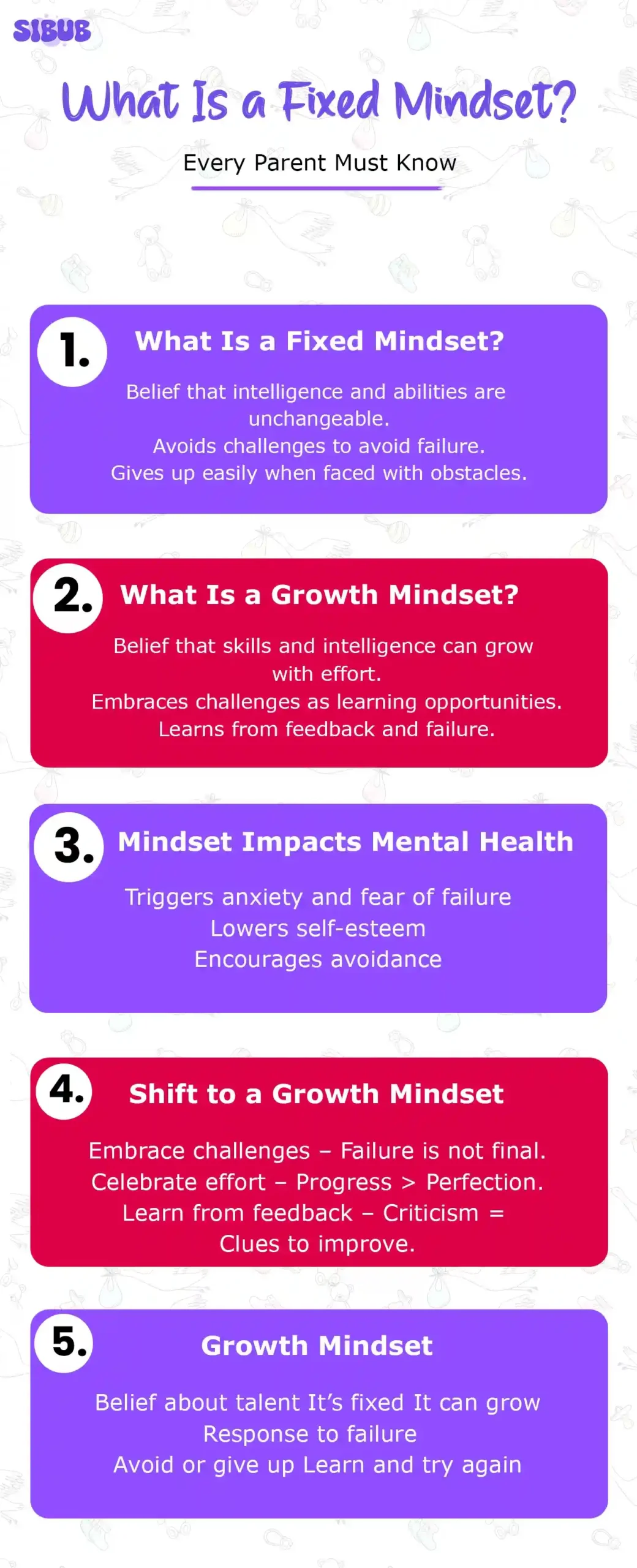“Whether you think you can, or you think you can’t, you’re right.”
This timeless quote by Henry Ford captures the power of mindset as eloquently as anything else. It brings to mind the fixed mindset, which can either enable or disable one’s ability to thrive.
Grasping what a fixed mindset is and how it is distinct from a growth mindset can redefine how we tackle problems, view setbacks, and realize our possibilities.
In this blog, we are going to explain the fixed mindset definition and highlight the growth mindset meaning while demonstrating how mindset shifts impact one’s mental health and overall success in life.
Are you ready to see how a shift in mindset can change your life perspective?
What Is a Fixed Mindset? The Basic Definition
Have you ever wondered why some people bounce back stronger from failure, while others seem stuck, afraid to try again? The answer often lies in one simple idea: the fixed mindset. But what is a fixed mindset, really?
To define fixed mindset clearly: it is the belief that your traits and intelligence are static. People who hold this view feel limited by their natural abilities. They often avoid challenges because failure feels like proof that they “just aren’t good enough.” This can lead to giving up easily or not trying new things.
Click for more: Hand, Foot, and Mouth Disease: Is It Contagious? | Key Facts
At a certain spot, when someone asks, “What is fixed mindset?” or “What’s a fixed mindset?”, they want to understand why some people don’t seem to grow or learn from mistakes. The fixed mindset meaning can be explained as: it’s a mental block that limits growth and keeps people stuck.

Growth Mindset Meaning: The Opposite of Fixed Mindset
On the other hand, a growth mindset is a thought process that believes; skills and aptitude can be gained through effort, steadiness, and steadfastness. Individuals with this mindset view challenges as opportunities for self-enhancement.
They regard mistakes as lessons, rather than failures.
Growth mindset encourages curiosity and resilience. It’s the notion that with time and practice, almost anything can be improved, and ultimately, the outcomes can be the best. This mindset helps to support mental wellness by alleviating the fear of failure and enhancing motivation.
How a Fixed Mindset Affects Mental Health
The fixed mindset definition is not purely about beliefs; it is entrenched into how we feel and respond, which impacts us on a deep level.
When you believe you can’t improve, you might:
- Avoid trying new things
- Feel anxious about failure
- Give up easily
- Experience low self-esteem
- Fear criticism or feedback
Thinking this way may result in being stressed out, struggling with depression and feeling less confident. Believing your potential never changes, every challenge seems to stay with you forever.
Check this out: Top Benefits of Summer Camp for Kids

Why Is It Important to Know What a Fixed Mindset Is?
Knowing what is a fixed mindset helps us spot it in ourselves and others. When we recognize them, we can more easily work on challenging them. For example:
- If you think you aren’t good at math, then remember that practice can help you improve.
- You learn to accept failure as something that paves the way to your goals.
Understanding the definition of fixed mindset empowers you to change your thinking habits and improve your emotional well-being.
Key Differences Between Fixed and Growth Mindsets
Here’s a simple breakdown:
| Fixed Mindset | Growth Mindset |
| Believes abilities are fixed and unchangeable | Believes abilities can be developed over time |
| Avoids challenges and risks | Embraces challenges as learning opportunities |
| Ignores feedback or takes it personally | Seeks feedback and uses it to grow |
| Gives up easily after failure | Persists through setbacks |
| Feels threatened by others’ success | Finds inspiration in others’ success |
Recognizing these differences helps you understand why your mindset matters so much in daily life.
Common Myths About Fixed Mindsets
There are some false ideas about the mindset fixed mindset that often confuse people:
- Myth: You’re either born talented or not. Reality: Everyone can improve with effort. Talent is just a starting point.
- Myth: If you fail, it proves you aren’t smart enough. The fact is, learning and growing include experiencing failures.
- Myth: People with a fixed mindset don’t want to improve. In reality, many individuals want to grow, but their beliefs make it hard for them.
Understanding these myths helps break down barriers to adopting a growth mindset.

Find out more: Emotions Wheel for Kids: Benefits and How to Use
Growth Mindset vs. Fixed Mindset: Which One Defines You?
The way you look at your strengths can influence the way you deal with everything in your life. Two main mindsets exist: the growth mindset and the fixed mindset. So, what is a fixed mindset? Basically, that belief is that traits like intelligence or talent remain fixed and cannot be changed. On the other hand, a growth mindset means you believe these qualities can be developed through effort and learning.
Discover: Hypothalamus Function: Hormones, Homeostasis and More
Let’s look at some clear examples:
Examples of a Growth Mindset
- I believe that anyone can learn new skills and improve over time.
- Even if I fail, I keep trying because failure is just a stepping stone to success.
- My progress depends on how much effort I put in.
- Every chance is an opportunity to expand my knowledge.
- And most importantly, I avoid saying “I can’t.”
Examples of a Fixed Mindset
- I think people are born either smart or not, and this doesn’t change.
- It’s too late for most people to change or learn something new.
- I see feedback as criticism, not as helpful advice.
- I believe I’m stuck with who I am and can’t do anything about it.
- If something goes wrong, I believe it can’t be fixed or improved.
- I tend to quit when things get difficult or don’t come easily.
Knowing these differences helps you spot whether you have a fixed mindset, which can limit your potential, or a growth mindset, which encourages continual learning and self-improvement. Understanding the fixed mindset meaning is key to unlocking change and progress in your life.
Why a Growth Mindset Matters for Mental Health
Switching from a fixed mindset to a growth mindset can boost your mental health by:
- Reducing fear of failure
- Encouraging resilience and problem-solving
- Increasing motivation and confidence
- Helping you embrace change and uncertainty
- Improving your relationships by being open to feedback
A growth mindset creates space for learning and healing, which is why it’s often a focus in therapy and self-help.
How to Move from a Fixed Mindset to a Growth Mindset
Changing your mindset takes time, but here are five simple ways to start:
- Embrace Challenges: See them as chances to learn, not threats.
- Celebrate Effort: Praise yourself for trying, not just succeeding.
- Learn from Feedback: Use criticism as a tool to improve, not a judgment.
- Stay Curious: Always look for new knowledge and experiences.
- Surround Yourself with Growth-Minded People: Positive influences help you grow.
Read more: Using OTC Drugs Runny Nose Medicine to Treat Cold
Why It’s Okay to Have a Fixed Mindset Sometimes
Even though a growth mindset has many benefits, having a fixed mindset isn’t always bad. Some people find comfort in routine and certainty. It can provide confidence and focus in certain tasks.
The key is balance. Recognizing when a fixed mindset limits you and when it helps you stay grounded is part of personal growth.
Final Thoughts: Understanding Your Mindset Can Change Your Life
The definition of fixed mindset shows us how beliefs shape our world. Whether in mental health, education, or career, mindset influences how we respond to obstacles and setbacks.
By learning what is fixed mindset is and understanding the power of a growth mindset, you can start unlocking your potential today. Remember, your abilities aren’t fixed. They grow with your effort, curiosity, and persistence.
Changing your mindset is one of the most important steps toward better mental health and success. So, ask yourself: Are you ready to grows.
